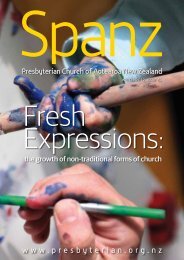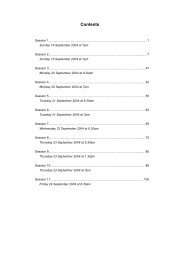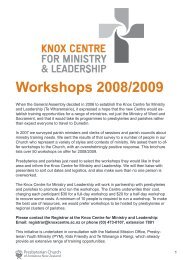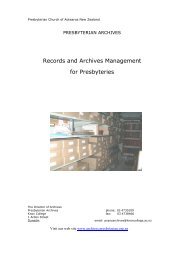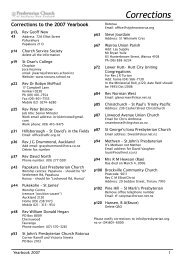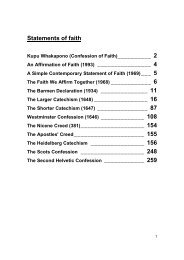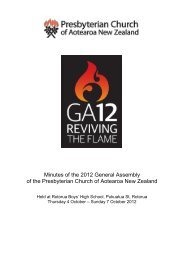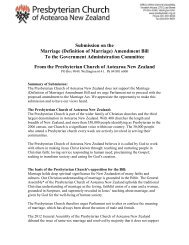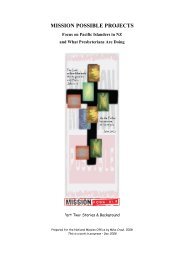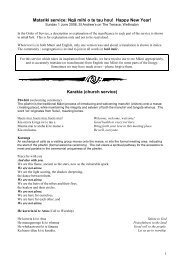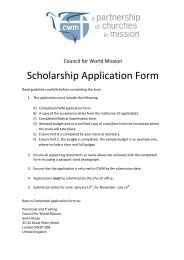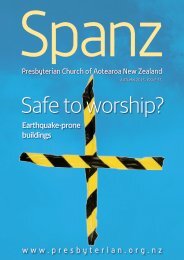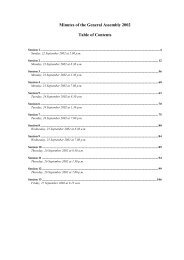Cultural diversity and unity in Christ: the Presbyterian Church of ...
Cultural diversity and unity in Christ: the Presbyterian Church of ...
Cultural diversity and unity in Christ: the Presbyterian Church of ...
You also want an ePaper? Increase the reach of your titles
YUMPU automatically turns print PDFs into web optimized ePapers that Google loves.
What k<strong>in</strong>d <strong>of</strong> church: ethnic <strong>diversity</strong> <strong>and</strong> ecclesiology.<br />
However <strong>the</strong> ma<strong>in</strong> issue I believe we need to focus on <strong>in</strong> consider<strong>in</strong>g this question is that, even if<br />
ethnic or culturally specific churches could be argued for on those grounds, it is difficult to defend<br />
<strong>the</strong>m ecclesiologically, when <strong>the</strong> nature <strong>of</strong> <strong>the</strong> church is exam<strong>in</strong>ed from a biblical or <strong>the</strong>ological<br />
perspective. There is no question that <strong>the</strong> “new immigration” is chang<strong>in</strong>g <strong>the</strong> demographic makeup <strong>of</strong><br />
western societies such as NZ. While migration has always been a fact <strong>of</strong> history, <strong>the</strong> unprecedented<br />
numbers <strong>of</strong> recent decades, <strong>and</strong> its spread to be from almost everywhere to anywhere, has significant<br />
implications for <strong>the</strong> nature <strong>of</strong> religion <strong>in</strong> those societies. For much <strong>of</strong> history <strong>the</strong> religion one belonged<br />
to was determ<strong>in</strong>ed by <strong>the</strong> geography <strong>of</strong> where one lived. One was born <strong>in</strong>to faith <strong>and</strong> religion formed<br />
<strong>the</strong> “sacred canopy” help<strong>in</strong>g to b<strong>in</strong>d societies toge<strong>the</strong>r, which is why ‘heretics’ were generally dealt<br />
with so harshly; <strong>the</strong>y were a threat to <strong>the</strong> social order. So religious communities were generally<br />
ethnically homogenous <strong>and</strong> religions only clashed when one ‘region’ moved <strong>in</strong>to ano<strong>the</strong>r, <strong>and</strong> was<br />
eventually settled when one side won aga<strong>in</strong>st <strong>the</strong> o<strong>the</strong>r <strong>and</strong> became <strong>the</strong> rul<strong>in</strong>g power. As<br />
secularisation happened <strong>in</strong> societies this ended <strong>and</strong> it lead to pluralisation <strong>of</strong> religion <strong>in</strong> those<br />
societies, as Peter Berger noted <strong>in</strong> <strong>the</strong> Heretical Imperative. Still <strong>in</strong> western societies this was ma<strong>in</strong>ly<br />
pluralisation <strong>of</strong> <strong>Christ</strong>ianity, <strong>and</strong> European denom<strong>in</strong>ational forms at that. All that has changed <strong>in</strong> <strong>the</strong><br />
last few decades with <strong>the</strong> arrival <strong>of</strong>, not only significant numbers from non <strong>Christ</strong>ian religions but<br />
also, greater numbers <strong>of</strong> <strong>Christ</strong>ians from non European ethnicities br<strong>in</strong>g<strong>in</strong>g <strong>the</strong>ir own ethnic forms <strong>of</strong><br />
<strong>Christ</strong>ianity <strong>and</strong> church with <strong>the</strong>m. So we now have pluralistic or multicultural societies <strong>in</strong> which<br />
people <strong>of</strong> a wider variety <strong>of</strong> ethnicities, religious identities <strong>and</strong> cultural practices are liv<strong>in</strong>g alongside<br />
each o<strong>the</strong>r, particularly <strong>in</strong> large cities.<br />
The New Testament<br />
Many scholars have po<strong>in</strong>ted out <strong>the</strong> parallels between this reality <strong>and</strong> <strong>the</strong> world <strong>in</strong> which <strong>Christ</strong>ianity<br />
spread <strong>in</strong> <strong>the</strong> first few centuries. “The region around <strong>the</strong> Mediterranean Sea was multil<strong>in</strong>gual,<br />
multiracial <strong>and</strong> multiethnic, with many different religions <strong>and</strong> philosophies. The Jewish groups <strong>and</strong><br />
Gentile nations comprised <strong>the</strong> multiplicity <strong>of</strong> cultures that <strong>Christ</strong>ianity sought to address <strong>and</strong> to<br />
embrace. In this multicultural arena, <strong>the</strong> <strong>diversity</strong> <strong>of</strong> early <strong>Christ</strong>ianity took shape.” 37<br />
While it is true that Jesus came as God’s Messiah for <strong>the</strong> people <strong>of</strong> Israel, <strong>and</strong> kept his mission<br />
primarily to <strong>the</strong>m, never<strong>the</strong>less he challenged <strong>the</strong> Jewish purity codes <strong>of</strong> his day which kept those <strong>of</strong><br />
o<strong>the</strong>r ethnicities as outsiders (as well as many Israelites as well). In <strong>the</strong> Gospel <strong>of</strong> Mark, for example,<br />
Jesus has table fellowship with <strong>the</strong> impure <strong>and</strong> <strong>in</strong>vites <strong>the</strong>m to follow him (2.13-17). He breaks<br />
Sabbath rules (2.23-28). He <strong>in</strong>cludes Gentiles as he engages with a demoniac <strong>in</strong> <strong>the</strong> unclean territory<br />
<strong>of</strong> <strong>the</strong> Gerasenes (5.1-20). He eats with <strong>the</strong> Syro-Phoenician woman (7.24-30). The climax comes as<br />
Jesus cleanses <strong>the</strong> supposedly ‘clean’ temple (15.15-19). He says, “Is it not written, ‘My house shall<br />
be called a house <strong>of</strong> prayer for all <strong>the</strong> nations?’ But you have made it a den <strong>of</strong> robbers” (11.17). The<br />
temple was <strong>the</strong> centre <strong>of</strong> monoculturalism, dedicated to exclud<strong>in</strong>g Gentiles <strong>and</strong> <strong>the</strong> impure. Jesus said<br />
it had to be destroyed (13.2) before it could become what it was meant to be, <strong>the</strong> house <strong>of</strong> prayer for<br />
all nations, ga<strong>the</strong>red from all corners <strong>of</strong> <strong>the</strong> earth (13.27). As Brian Blount puts it, “In Mark’s<br />
revelation <strong>of</strong> <strong>the</strong> future <strong>in</strong> <strong>the</strong> midst <strong>of</strong> <strong>the</strong> present, <strong>the</strong>n, k<strong>in</strong>gdom worship is multicultural worship.” 38<br />
If those who followed Jesus did not immediately grasp this <strong>the</strong> way <strong>the</strong> Spirit worked <strong>in</strong> Acts<br />
cont<strong>in</strong>ually rem<strong>in</strong>ded <strong>the</strong>m <strong>of</strong> it. From <strong>the</strong> day <strong>of</strong> Pentecost <strong>the</strong> early church was multicultural, made<br />
up <strong>of</strong> those from many nations <strong>and</strong> miraculously speak<strong>in</strong>g <strong>in</strong> many languages (Acts 2.5,6, 9-11). We<br />
<strong>the</strong>n see this be<strong>in</strong>g enacted with <strong>the</strong> gospel be<strong>in</strong>g extended to Samaritans, (8.5), an Ethiopian Eunuch<br />
(8.27) <strong>and</strong> f<strong>in</strong>ally Gentiles (10.28). Peter’s declaration, aga<strong>in</strong>st all his preconceptions which took<br />
some dramatic work by God to change, that people <strong>of</strong> all nations <strong>and</strong> cultures are acceptable before<br />
God <strong>and</strong> that Jesus is Lord <strong>of</strong> all (Acts 10.34–36) was to be decisive <strong>in</strong> open<strong>in</strong>g <strong>the</strong> door for<br />
37 David Rhoads, The Challenge <strong>of</strong> Diversity (M<strong>in</strong>neapolis: Fortress Press, 1996) 2.<br />
38 Brian K Blount, ‘The apocalypse <strong>of</strong> worship: A house <strong>of</strong> prayer for ALL <strong>the</strong> nations’, <strong>in</strong> Mak<strong>in</strong>g room at <strong>the</strong><br />
table: An <strong>in</strong>vitation to multicultural worship, eds. Brian K Blount <strong>and</strong> Leonora Tubbs Tisdale (Louisville, KY:<br />
Westm<strong>in</strong>ster John Knox Press, 2001), 25.<br />
11



